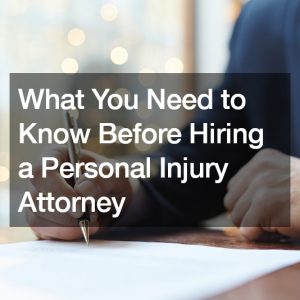Car accidents are an unfortunate fact of life, and the statistics are sobering. There’s an average of 7.3 million motor vehicle accidents each year in the United States. These accidents can range from fender benders to fatal wrecks. Whether an accident is your fault or not, you will need the help of professionals.
These people may include anyone from an insurance adjuster to a DUI attorney. An auto accident, no matter how serious, is scary and can change your life physically, mentally, and legally. As a driver, you must be aware of the many facets involved following an accident.
You’ll need to know what to do at the scene. Who to call following the incident, ensure you receive proper medical care, and more. This blog will provide a comprehensive accident resource guide on navigating the process following an auto accident.
1. Understanding Auto Insurance and Claim Process

Immediately following a car accident with another vehicle, ensure everyone is alright. Then, calling the police is vital, even if the damage seems minimal. It will be much easier for insurance companies to process your claim with a police report. The officers can take every piece of information and write all the details into a formal statement. You’ll also want the police to mediate if anyone gets carried away.
Take pictures of the scene and the vehicles. The auto insurance company will ask for photos as well. As soon as possible, call your insurance company. Provide them with your insurance information and all documentation from the accident. The insurance company may send an adjuster to photograph the damage. The insurance representative will direct you to get at least 2–3 estimates, and you’ll need to go to body shops approved by the company.
Depending on the type of coverage and your deductible, they will handle any communication with the other parties’ insurance company. Once you have the estimates, you’ll need to check your deductible. If the damage is not more than your deductible, your auto insurance company will not pay anything, but they will pay anything above that. For example, if your deductible is $500 and the damage is $2000, they will pay $1500.
If you live in an at-fault state, your insurance company will file a claim with the other driver’s company to get your deductible. If you live in a no-fault state, you’ll be responsible for the deductible. Don’t be afraid to ask the insurance representative about other costs they may cover, like car rentals and towing company fees. Again, it depends on your coverage plan.
Many companies will pay at least a portion for a rental car while yours is being repaired. The most important thing you can do is to prepare yourself before an accident occurs. Choose the right coverage for your vehicle and be aware of the fine print. Keep your insurance card and copy of your policy in your glove compartment at all times. It’s an invaluable accident resource.
2. Hiring a Car Accident Lawyer

Following a car accident, you may find yourself in need of a lawyer. Depending on the consequences of the accident, the type of attorney will vary. For instance, if you disagree with the settlement offer from the insurance company, you may need a lawyer who specializes in pursuing denied claims. If you were injured, require therapy, or other services that are denied, you will have to contact an accident injury lawyer. These lawyers typically work for a large personal injury law firm.
Whatever type of lawyer you need, it’s crucial to research thoroughly and use caution. Many lawyers needing clients will peruse police reports and court records for potential clients. If you’ve ever had an accident, you may have noticed that you get massive amounts of unsolicited mail from law firms in the days following. This is not the best way to choose an attorney.
Your best bet is to ask friends and family who may have had a similar situation. Having a support system following a car crash is a valuable tool in your accident resource box. You can also try posting anonymously on local social media groups. Most people are usually eager to refer a lawyer who did an excellent job for them.
Consider choosing a lawyer who gives free consultations and doesn’t charge unless there’s a settlement. When meeting with the attorney, bring all your documents. Be honest, and don’t be afraid to ask questions.
Ask about their experience and record of success with your type of case. Discuss how they communicate and any out-of-pocket expenses you may incur. You’ll spend a lot of time interacting with your attorney, so be sure you’re comfortable with them.
3. Exploring Personal Injury Attorneys and Their Specialties

When you’ve been injured in a motor vehicle crash, it can be devastating not only physically but mentally and financially. If you’re unable to work due to injuries caused by the accident, you immediately want to contact a personal injury lawyer. These professionals are an essential accident resource and can help you with multiple issues. They assess the degree of loss you have suffered, including lost wages, medical bills, rehabilitation, care costs, pain and suffering, and emotional distress.
A personal injury lawsuit can be filed against an insurance company or the person responsible for injuries in an automobile accident. A personal injury lawyer specializes in pursuing damages for injuries suffered anywhere from a car to retail stores. Since the injuries vary so widely and can be complex in nature, there are many sub-specialties under the umbrella of personal injury attorneys.
For example, if you were involved in a rear-end collision and have back injuries, you may consider a spinal cord injury lawyer. These are lawyers who are familiar with those injuries and have experience in researching and arguing a spinal cord injury case. They have specialized resources to help build your case. Some lawyers specialize in other areas related to car accidents, like brain injury, broken bones, and internal injuries like liver and spleen damage.
Depending on the case’s specifics, you can also find lawyers well-versed in drunk driving, distracted driving and trucking company negligence. In general, personal injury attorneys will thoroughly review all documents, visit the accident site, ensure you go to a doctor who will document your injuries. A personal injury attorney will work to get you the best possible settlement.
4. Dealing With DUI Offenses

According to statistics, the number of drunk driving fatalities has decreased by 36% over the past decade. Car accidents caused by alcohol have declined by an average of 50% in many parts of the country. This is due in large part to the popularity of the ride-share industry. People are much more likely to call an Uber or Lyft than to drive if they think they’ll be drinking later on.
However, alcohol-related car accidents are still a huge problem. Drunk drivers are responsible for over 10,000 deaths each year. Some people are still under the impression that alcohol doesn’t affect their ability to drive a car. This thought process can land them in deep trouble.
A DUI can carry a wide range of severe consequences, depending on how serious the accident is. A conviction can lead to anything from losing a driver’s license to jail. Regardless of the circumstances, you will need an excellent drunk driving lawyer. Your defense begins from the moment you are pulled over.
If the police suspect you’re under the influence, they will request you submit to a field sobriety test. Most legal experts agree that you shouldn’t refuse this test as it’s considered an admission of guilt in most states. If you fail, you’ll be arrested and charged. Depending on the state (and if you have other DUI offenses), you may be given a summons for a court appearance, or you could be held until a court appearance.
It’s vital to remain calm and compliant throughout this part of the process, as your demeanor will be noted in the police report and will be presented to the court. As soon as you can, you’ll need to find an attorney who is experienced at defending drunk drivers. Time is of the essence in this situation, so act quickly. When you’ve obtained a lawyer, be honest about the case.
Depending on what your blood alcohol level was and any other charges (often reckless driving, open containers, and destruction of property are tacked on), your lawyer will discuss the penalties and possible options. An effective DUI attorney will investigate the evening events, talk to the police officers, and even call for maintenance records for the breathalyzer machine. Sometimes, the lawyer can find a technicality and have the case dismissed, but this is a rare occasion. If you were legally intoxicated, you’ll need to prepare yourself for the court date.
A lawyer may be able to reduce the charges, but you will likely need to surrender your driver’s license to the judge on your court date. So be prepared to get a ride home. Laws vary widely from state to state; for a first offense, you may lose your license anywhere from 30 days to 3 months. You’ll be fined at the local and state level. These fines could be as much as $5,000.
The judge may also require you to have an interlock device installed on your car when you do get your license back. This breathalyzer allows the vehicle to start only after you’ve blown into it. It’s likely that once your insurance company learns of your conviction, they will cancel your coverage.
You can reapply or find other companies, but be prepared to pay double or even triple your original rates. A drunk driving offense may also affect your job, especially if driving is part of your job description. You’ll need to discuss options with your employer, as well as find alternatives to getting to work and every place else.
5. Reclaiming Both Legal and Personal Stability
How you reclaim stability following a car accident depends on whether you are the responsible party or the victim. For example, if you were convicted of drunk driving, depending on your lawyers drivers license reinstatement negotiation with the court, you could be sentenced to a DUI intervention class. It’s not only essential to take part in the class to regain your driving privileges but also to truly see the consequences of your actions.
During the class, a counselor may evaluate you to see if you have a problem with alcohol as well. The best way for you to recover personal stability, in this case, is to be honest with yourself and others. Take responsibility for your actions and work towards making amends and paying all fines. Consider taking help from others; you’ll be glad you did.
If you were a car accident victim, several steps must be taken to regain your overall stability. First, if you were injured, make your physical recovery the priority. Keep up with doctor’s appointments and therapy if needed. Exercise, eat healthily, and stay hydrated. Consider going for massage therapy and other alternative treatments in conjunction with traditional ones.
Next, focus on your mental health. Depression, anxiety, mood swings, flashbacks, and fear can all surface after an accident. Consult a therapist, counselor, or doctor to help with these feelings. There are also many support groups and online communities that offer encouragement and ways to cope. Don’t be afraid or embarrassed to seek out help.
Throughout all of this, keep all documentation, from doctor’s bills to court records. This paperwork will be a vital post-accident resource when tackling your finances. Car incidents can be expensive whether you were at fault or not, and insurance claims and court settlements may not immediately come. If need be, arrange payment plans with whomever you can. This will ease the financial stress and give you room to breathe.
An auto accident can be a stressful and harrowing experience. The process of recovering physically, financially, and legally can be daunting. But knowing what to expect and being prepared can take some of the sting out. We hope our accident resource guide helps along the way.





